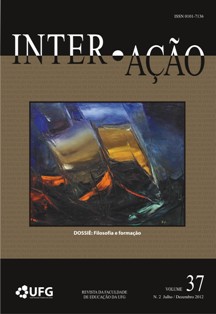EDUCATION, SCHOOLING AND FORMATION
DOI:
https://doi.org/10.5216/ia.v37i2.20728Keywords:
Educação, Escola, Formação, Autonomia.Abstract
This article deals with the intrinsic relationship between education, schooling and formation. In the Greece of the classical period, the Greeks sought the original meaning of a person’s formation for public life, in view of the existence of the polis and the excellent and righteous man, which requires constant care and vigilance over people’s interests and wills. This is the reason for the meaning and fundamental importance given to paideía, to education as civic and cultural formation for e?ective participation in collective life. Having taken the opposite path, today education and schooling have got lost in concerns about what is practical, utilitarian, quali?cation, professionalization, preparation for the labor market, and have forgotten the primary meaning of their existence, namely, to see to it that people, society and humanity seek excellence and a virtuous life. Education, di?erent schooling, is are not only possible but necessary and working to bring this about is defending the cause of autonomy, freedom, politics, and the primacy of public life and ethics.Downloads
Downloads
Published
How to Cite
Issue
Section
License
Inter-Ação uses the Creative Commons Attribution 4.0 License for Open Access Journals (Open Archives Initiative - OAI) as the basis for the transfer of rights. Open access means making documents available on the Internet free of charge, so that users can read, download, copy, distribute, print, search, or link to the full text of documents, process them for indexing, use them as input data for software programs, or use them for any other lawful purpose, without financial, legal, or technical barriers.
Authors publishing in this journal agree to the following conditions:
1) Authors retain copyright and grant the journal the right of first publication, with the work simultaneously licensed under the Creative Commons Attribution License, which permits redistribution of the work with attribution and first publication in this journal.
2) Authors are permitted to enter into additional, separate agreements for non-exclusive distribution of the version of the work published in this journal (e.g., for publication in an institutional repository or as a book chapter), with attribution and first publication in this journal.
3) Authors are permitted and encouraged to publish and distribute their work online (e.g. in institutional repositories or on their home page) at any time before or during the editorial process, as this may generate productive changes as well as increase the impact and citation of the published work.















